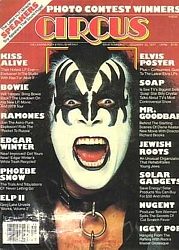 |
Title: The Odyssey Of Tom Waits Source: Circus magazine (USA), by David Koepp. Issue nr. 171, December 22, 1977. Photography by Michael Putland. Thanks to Dorene LaLonde for donating article Date: New York City, 1977 Key words: Potter's Field, Frank Vicari, Chip White, Andy (Danny?) Trifan, Paradise Alley Magazine front cover: Circus magazine. December 22, 1977 |
| Accompanying picture |
The Odyssey Of Tom Waits
The Raspy Voiced Piano Man Has Time for the Future
by David Koepp
Tom Waits is huddled into the corner of a booth of a timeworn Italian greasy spoon on 23rd Street. Stooped over, round shouldered, Waits is shivering from the diner's open door. Outside, a cold rain is falling. Sucking on a mauled cigarette, Waits draws deep, and then with a tired sigh blows the smoke out. "I never like to sit with my back to the door", Waits explains as he pours milk from a carton into a plastic cup that once held his grape drink. "Two years ago, I was walking in that door and I saw some kid get it in this place." Pointing at a now-quiet juke box, Waits says, "Some guy had just shot him, he was sprawled right there against the wall. I was scared shitless . . . Homicide has a popular attraction to me. I keep my ears and eyes open."
Homicide indeed has found a place in Wait's music. "Small Change," the title tune from his last record, tells the gut-wrenching tale of a smalltime hood's bloody demise on a battle scarred urban sidewalk. A bit later, we're sitting in the lobby of the Chelsea Hotel, and Waits, sounding world-weary, talks about "Potter's Field" off his newest album Foreign Affairs. "Potter's Field is just a stone's throw from Riker's Island, you know, the prison. When someone is found cold on a street, with no identification, they freeze 'em until they're identified, and if nobody claims 'em, and they aren't identified, they just throw 'em in a pine box with all their personal belongings and effects."
Waits sighs, takes a long tired drag on his cigarette, slouches nearer the tape recorder and begins anew. "They put 'em on a barge and send 'em out to Potter's Field. Bela Lugosi (the original Hollywood Dracula), was buried in Potter's Field - he made eleven million dollars and died penniless on the Lower East Side. It's right out of Dante's Inferno, they put 'em on a barge that leaves at midnight, they scratch their name on the side of the coffin with a piece of chalk, they throw 'em in a mud ditch. They stack 'em twelve high in the excavation. So 'Potter's Field' is my story about a stool pigeon in a bar selling information to a hit man who's lookin' for a guy named 'Nightsticks' who's hidin' out in Potter's Field. It's mostly a mystery like 'Odd Man Out.' "
Even though he recently lost his regular bass player(1), Waits is very enthusiastic about his band. "I've got Frank Vicari on tenor sax. Frank's an old veteran of the Woody Herman Band and Maynard Ferguson. He spends a good deal of time with me, he's my right hand man. I look up to Frank a lot. Musically he's brilliant. I've learned a great deal from Frank . . . I've also got Chip White on vibes and percussion, and Andy Trifan on upright bass."
Waits' music is the stuff of piano and strings ballads and the be-bop, finger-pop, scat-talk jazz poetry. But he doesn't just sing about the Soul of the American Saturday Night, the man lives it. Waits is shaking, shivering and saying, "There's somethin' about what I'm doin' - I'm kind of obsessed . . . not in the sense (of being) psychotic. It's just I've got a lot of miles under my belt . . . I can't go back . . . it's very difficult for me to go home . . ." The man is real - listen to him.
Amid talk about his road life, Waits mentions another development in his career. Disregarding a noisy nearby family, Waits excitedly remarks, "I'm writing a song for Sylvester Stallone right now. It's for a film called Paradise Valley(3), which is about Hell's Kitchen in the Forties. I'm gonna play a character named Mumbles, who plays piano in a bar. I think work begins in January, and I'm looking forward to that."
Notes:
(1) He recently lost his regular bass player: Dr. Fitz(gerald) Jenkins, replaced by Danny Trifan late 1977. Further reading: Performances
(2) Paradise Valley: should read "Paradise Alley". Movie directed by Sylvester Stallone. Tom Waits: actor, composer. Movie debut as pianist Mumbles. On soundtrack: "Meet Me In Paradise Alley" and "Annie's Back In Town".
- Peter Guttridge (1983): "Sylvester Stallone hired Waits for a cameo role in the ill-fated 'Paradise Alley' as a Hoagy Carmichael bar pianist. A few snatches of his music make it onto the soundtrack, though Waits did not score the movie nor write the main theme, sung over the credits by Stallone himself. Intended as a Damon Runyan comedy the film didn't fare too well with either critics or public. 'I went and sat in front of a piano for three weeks and then I went home. I didn't go to see it after.' Waits' appearance seems rather truncated in the film. He agrees. 'I had more scenes but they got cut. I finally saw it on TV with my wife (a script-writer from Twentieth Century Fox he married in '81 after breaking up with long-time partner Rickie Lee Jones). I sat her down to watch it, got really excited - look honey, here I am - shit where'd I go?' (Source: "A Simple Love Story" City Limits magazine (UK), by Peter Guttridge. Date: London. July 1-7, 1983)

